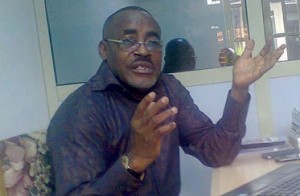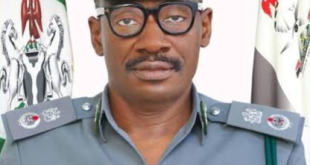
Chief Chris Orode retired was an Acting Chief Executive Officer (CEO) of the Nigerian Shippers’ Council (NSC) after nineteen years of service. In this chat with Ifeoma Oguamanam, he explains his roles in midwifing the Council for the Registration of Freight Forwarding in Nigeria (CRFFN); the supposed roles of the Shippers’ Council and the standards expected of the freight forwarders in the country.
What are the roles of the Nigeria Shippers’ Council as constituted by the government?

The Nigerian Shippers’ Council as a government agency is saddled with the responsibility of protecting the interest of cargo owners and these interests are varied. From the first day an importer or exporter decides to go into import business, that is where Shippers’ Council’s attention needs to be sought but the funniest thing is that people in Nigeria like the ‘do it yourself’ way. They believe that when you go to the government, the government is out there to collect taxes from them, but Shippers’ Council is actually an agency set up to protect the interest of shippers and the freight forwarders are one of the providers of shipping services.
That is the more reason why in that relationship, the Ministry of Transport deemed it wise to saddle them with the responsibility to organize the freight forwarders, that is history now as freight forwarding in Nigeria is now more respected. We believe and hope they will build on their achievements so far. Also, the Council for the Registration of Freight Forwarding in Nigeria posted a public notice for the collection of their fees and by the time they start collecting these fees, they will be stronger and they will be able to carry out a lot of enlightenment and awareness for their members, agents and importers, it will be a proper body as it is supposed to be when compared to other clime.

With the Shippers’ Council playing the role of a regulator in the industry, they have strategic engagements with all the registered key providers of shipping services. Shippers Council will be there to make sure that what is supposed to be is what is done. There is sanity in the maritime business in other climes but in Nigeria, it is like a free-for-all market which should not be. International trade is a business that is guided by rules and regulations with standards.
Nigerians are very shy dealing with the government but NSC is very much in the grass root, Shippers’ Council, apart from their head office in Apapa, has regional offices in Kano, Aba, Port Harcourt, Jos, Warri and Calabar. These are areas of key maritime business interest areas. So, shippers that are interested in knowing their rights and obligations should first visit NSC and they will make available to them all they need to know, either as an importer or as an exporter but the problem there is that they don’t want to because the Shippers’ Council is a government agency.
Can you tell us some of these rights?
If you want to go into import business, you need to know your rights and obligations. For instance, you need to know what the different import procedures are if you are to go into importation which some people don’t know. First and foremost, they must have a link with a foreign partner, a friend there or a contact through the internet, knowledge of the import items, then the foreign partner will send you a proforma invoice. With that profoma invoice, then they can go to their banker and the bank will make available to them the form M to fill which will capture all the necessary details of that transaction and then the bank will request for the commercial invoice. Once that is done, if you are paying from here, of course, the bank will inform the importer abroad that payment has been concluded but if it is based on approved form M and it is to be paid for when the goods arrive here, then in that case the bank will retain the funds, it indemnifies the importer that once the goods arrive, they will make the money available to the importer.
Once the bill of laden arrives, its original is deposited with bank because they have already received the payment for those goods, that is, if the good is shipped based on approved form M, then the good is released. All the original bill of laden and packing list will now be made available and the freight forwarder will go and take delivery on behalf of the shipper. That is the nutshell of import guideline as regards if you need to go through the banks, some people travel and buy goods there and want to send it down, all they need to do is to make sure they meet their freight forwarder over there and he will arrange for the vessel, he knows the sailing position of different vessels and when you want the goods to arrive Nigeria. They will initiate the shipment and they will inform you that the shipment has been shipped, if you pre-paid the freight, your goods will be shipped and the bill of laden will be sent to you not through the banks this time, maybe through courier and when you get it, you go to the Customs to ascertain the valuation, the import duty and the necessary government taxes you need to pay and once you do that, you get your goods and this can be done by your local freight forwarder.
Eventually, when Nigerians have developed in international trade, you can sit in your house and do all these transactions, you do not need to involve yourself, the freight forwarder will do the valuation and make sure the examination is done, the terminal operator bills and invoices are collected, the shipping bills are collected and payments are made and the goods are released and he takes delivery and you pay along with deposit for the containers and the goods are delivered to your doorstep and you pay for his services. But the problem there is that these freight forwarders with the presence of regulatory agencies need to carry out a lot of training and enlightenment but by the time they start making their collections after the first one year, they will be in a stronger position to put the freight forwarding industry in a very strong pedestal.
When Nigerian Maritime grows to the point where importers can from the comfort of their homes with a computer conveniently do import business, what will become the fate of freight forwarders in Nigeria?
They will diversify, freight forwarding is international, it’s only that the numbers will reduce, and there will be a need to consolidate. Only a few of these freight forwarders have license but only that out of that few licenses, there are a number of people that use Mr. A’s license, they might be twenty or more which is not supposed to be, so there might be consolidation. So, from your house depending on the quantum of goods you are handling if it is something you cannot handle alone you now need to make use of your freight forwarder.
Do you buy into the idea as proposed by NCS that freight forwarding and logistics in Nigeria should be indigenous?
Yes, because even abroad in developed world, you do not see Nigerians having the free hand to do freight forwarding business like they do here. The business is not enough for us, why should we allow foreigners to come and fish in our waters. So, if all the freight forwarding industries and companies are Nigerian-owned and you have foreigners working under those Nigerian companies, no problem, but for them coming in to take a big chunk of the business when the little here is not enough for us, I think it is wise if there is a clamour against that.
What do you have to say about the trucking system in Nigeria?
Incidentally, since 2011, I have been a Consultant to the Association of Maritime Truck Owners (AMATO) and that is to say that all their efforts to be able to solve the chaos in the traffic situation in the access roads towards and within the ports, I have been involved in all the briefs, memos, and letters that have been written, I have been involved in it. It is only that Nigeria is a very difficult country, in the sense of wanting change and the problem is compounded because initially, in the port, some areas were strictly for some industrial business, subsequently, the other areas were concessioned. Before this process was initiated, the ports had marshalling yard and holding bay for trucks, there was no need for trucks coming around but, with these two regimes coming on board, the marshalling yard and holding bay were concessioned in the sense that the truckers had no holding bay or marshalling yard, it is just like the port, they have the dock yard to receive vessels because these vessels are bringing goods from abroad but these trucks are to collect these goods to their final destination, so there is supposed to be a place for the trucks and it’s not there and it is an aberration.
The trucks must do business and because of the way trucks are received into the ports, there is no call up system. If there is an electronic call up system in place, there will be at least, some level of sanity, as it is now, it is a free-for-all market; a trucker comes in, he picks a laden container, he goes to deliver the container, after which he tries to maneuver his way to come close to the port gate with the thinking that once he gets there, he will have access to get into the port, and when he is in, he does not want to get out until he gets another container. Business should not be like that, things should be done orderly, it is not so in other clime. We have been making efforts to see that first and foremost there is a truck park, but as it is now, there is no truck park in Nigeria serving the port. But efforts are being made by the agents and I know Nigeria Shippers Council (NSC) and Nigeria Ports Authority (NPA) are on top of it to make sure a truck park is in place. Once this is done, that will be the take-off of E-Trucking Call-Up system because, once there is a truck park, we can now initiate the call up system which indicates that the terminal operators will upload all their Truck Delivery Orders (TDOs) which have released the previous day into the system of the call-up, there will be an interface between the terminal operators and this call-up system, so also, there will be an interface between the freight forwards and the call-up system. Once the terminal operators upload all their TDOs for the previous day to the system, the system will now be organized based on the freight forwarders making request.
For instance, a terminal operator may have a TDO of fifty numbers, he may not want to take delivery of all the fifty containers at the same time, so may be in a day, he may program ten or twenty containers, he will now access the call-up system and a unique code will be assigned to those transactions when payment is made for the service, a Radio Frequency Identification Number (RFID) will be registered on the truck because all the trucks will be registered with the system. The truck that the terminal operator had indicated he wanted to use for that business will have something like an access card, so once that truck has been assigned a transaction, a number is assigned to that truck and the truck gets an alert. The freight forwarder gets an alert also that his truck has been given that same number and the same number registers on the driver’s phone just like the bank alert, that he now has access to go to the port at a particular date and time and there will be sanity.
When the truck now decides to move, the call-up system has RFID at strategic locations, let’s assume you are coming from Mile 2 axis, there will be an RFID that recognizes the truck from a distance, that the truck has clearance and he will be allowed to move, but if it is not allowed, the truck marshal and the traffic operating staff, LASTMA, FRSC and Police will now make sure that the truck goes back. There will be RFID on Mile 2 bridge and if you are coming from Badagry without access, you will be turned back from that bridge. Also, on Orile, Eko and even at Western Avenue bridge, as you get to Seven-Up, there will be an RFID that will turn you back if you have no access.
The RFID will be installed at these strategic places; already a park has been mapped out for the trucks at The Lagos International Trade Fair Complex along Lagos/Badagry Express way with the capacity to manage between three thousand to four thousand trucks and with this system, freight forwarders will be aware of how many turns there trucks can go in a week and subsequently, in a month. This also means that banks can now finance trucking as a business because they can be sure that of getting their investment back.
When is this Call-Up System taking off?
Very soon, I will not like to be too specific but I can assure you that everything is in place and with all things being equal; the Call-Up system will take off before the end of this year.
 MMS PLUS NG – Maritime, Aviation, Business, Oil and Gas News Online Newspaper with coverage in Maritime, Oil and Gas, Aviation, Power and Energy as well as Financial News
MMS PLUS NG – Maritime, Aviation, Business, Oil and Gas News Online Newspaper with coverage in Maritime, Oil and Gas, Aviation, Power and Energy as well as Financial News










Good work by MMS Plus team.
But your correspondence should be exposed to some capacity building programmes on maritime related topics. This will put them in a better position to clearly understand issues being addressed during an interview and thus assist them to properly covey the message intended by the interview.